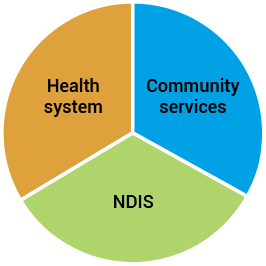How does the NDIS fit the broader mental health system?

The NDIS is designed to complement existing community services and is not a replacement for clinical services, mental health case management or medical care. A person accepted into the NDIS is likely to require assistance from the health and mental health system in addition to the NDIS to meet their mental health support needs.
Some programs within the NDIS may previously have been funded to organisations. Now organisations will be creating services for individuals to purchase through the NDIS. You may find in time that a range of services are developed that more closely meet your family needs as a consequence of increased consumer and carer input. The mental health system will still have a responsibility to provide services and supports to individuals with mental health issues who are not eligible for an NDIS funding package.
Who does the NDIS assist? Is my family member eligible?
Not everyone with a disability or mental health issue will be able to access an individual funded package of support through the NDIS. There are several ‘access requirements’ or rules which determine who can get funded support.
To be eligible, a person must:
- have a significant and permanent disability (or likely to be permanent) , or a need for early intervention that significantly affects your ability to take part in everyday activities.
- live in an area where the NDIS is operating.
- be under the age of 65 when they enter the NDIS.
- be an Australian citizen or hold a permanent visa or a Protected Special Category visa.
The NDIS has an assessment process to determine eligibility, and whether the supports you request are considered reasonable under the circumstances.
Some people with existing support through mental health community services may ‘rollover’ into the NDIS. It may be worthwhile calling the NDIA on 1800 800 110 to see if your family member is known to the agency already, or whether they will need to apply. It will help if your family member authorises for you to be a nominated person [link] to interact with the NDIA on their behalf. They may need to be available on the first phone call to provide consent.
There are a number of services available to assist in the access process. You may seek assistance from trusted organisations who currently support you.
For information about how the NDIS may be helpful in your situation or to discuss whether your family member may be eligible, call Ready, Steady, NDIS on 1800 314 325.
My family member isn’t interested in the NDIS. What can I do?
In order to access funded supports, a person will need to consent to participation in the NDIS. We recognised that this presents barriers and can create family conflict at times. Supported decision making may be a process that takes some time for a family member with mental health issues to understand how the NDIS may be of benefit, and it may assist to introduce them to examples of where it has assisted a person in their life. The reimagine resource may assist you to offer some examples of what is possible in the NDIS to assist them to make that choice.
In some complex circumstances you may have the capacity to represent directly on behalf of your family member. It may assist to explore this with an advocate directly. Call Tandem’s Ready, Steady, NDIS hotline on 1800 314 325 for further assistance.
Resources
For a free-of-charge translator or interpreter when calling NDIA, phone 1800 800 110.
Translator and interpreter service, including easy English guides
Participants from culturally and linguistically diverse backgrounds may require assistance to access translation and interpreting services in order to implement the supports available in their NDIS Plan.
Guardians and nominees in the NDIS